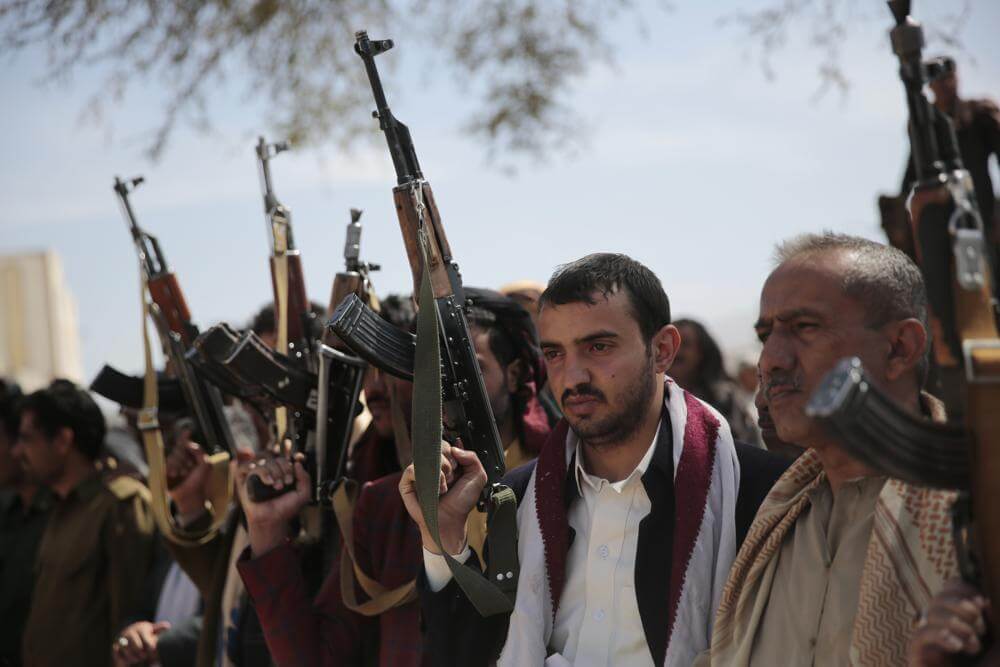The United Nations Security Council (UNSC) on Wednesday blamed the Iran-backed Houthi rebels for the failure to extend the ceasefire between Yemen’s warring sides. The truce was scheduled to be extended on 2 October for six more months but talks collapsed over the Houthis’ “maximalist demands.”
The UNSC expressed its “deep disappointment” that parties could not extend the truce for the fourth time and said negotiations failed after the Houthis made unsustainable demands during the final days of talks. It said the ceasefire, which lasted for six months, “had brought more calm and security than at any point in the past eight years, including a sharp reduction in civilian casualties.”
The truce aided the Yemeni government’s efforts to increase fuel supplies to the country through the Hodeidah port and also allowed for the passage of commercial flights to and from the capital Sana’a.
#UNSC press statement on #Yemen:
— UK at the UN 🇬🇧🇺🇳 (@UKUN_NewYork) October 5, 2022
➡️deep disappointment at passing of deadline to extend truce.
➡️welcomes government of Yemen’s engagement with @OSE_Yemen.
➡️Houthis’ maximalist demands in the final days of negotiations hindered @UN efforts to broker agreement. pic.twitter.com/kiuzA5CwVl
“With an extension to the truce, these benefits for the Yemeni people would continue to grow, including paying Yemen’s teachers, nurses, and other civil servants, opening roads in Taiz and around the country, expanding international flights, and ensuring that fuel flows more freely into Hodeidah port,” the statement noted.
The Council also stated that extending the ceasefire would “provide the opportunity to reach a ceasefire and ultimately a Yemeni-led inclusive and comprehensive political settlement.” The release said, “The members of the Security Council urgently called on the Yemeni parties, in particular the Houthis, to refrain from provocation, prioritise the Yemeni people, and return to engaging constructively in negotiations under the auspices of the United Nations.”
On Sunday, the UN special envoy for Yemen, Hans Grundberg, announced that Yemen’s warring parties had failed to reach a deal to extend a nationwide truce. Grundberg said he “regrets that an agreement has not been reached” and urged the warring sides to “maintain calm and refrain from provocations or any actions that could lead to an escalation of violence.”
Govt of Yemen’s support for @OSE_Yemen efforts to achieve a secure & sustainable peace is based on the agreed upon terms of reference: 1) @GCC Initiative & its implementation mechanism; 2) outcomes of the Comprehensive National Dialogue Conference; and 3) #UNSC Res. 2216. 6/6
— Yemen Embassy D.C. (@YemenEmbassy_DC) October 1, 2022
The Houthis, however, blamed the “intransigence” and “aggression” of the United States-Saudi Arabia alliance for the collapse of the talks. The rebels said they are considering using “military options,” claiming the Saudi-led coalition is conducting “aggressive operations” and “looting” Yemen’s wealth.
Furthermore, a Houthi analyst said, “Sana’a possesses a large map of sensitive and strategic targets in the depths of the countries of aggression and has the military ability to destroy them, and it will be painful, and that the internal fronts will all be targeted as well.”
On the other hand, the US blamed the Houthis for derailing talks by making “impossible” demands at the last moment, including the payment of salaries for all their military and security personnel. US envoy for Yemen Tim Lenderking noted that Iran’s role in the negotiation continues to be “quite negative.” He warned that without a truce, Yemen could witness major violence again.
We are deeply concerned the @UN-mediated truce in Yemen expired without an agreement on an extension. We urge the parties to exercise restraint and continue negotiations. The only way to truly ease the suffering of Yemenis is through negotiation, not war. https://t.co/yTne53p9dT
— Ned Price (@StateDeptSpox) October 3, 2022
“We, and the international community, are calling for restraint from all parties. At this particularly sensitive time when there is no truce officially on the books that has been agreed and welcomed and adhered to by the parties, we must insist that there be maximum restraint exerted by all sides,” Lenderking stressed.
Yemen’s Houthi rebels and the Saudi-led coalition had first agreed to a two-month ceasefire in April, bringing much-needed relief to the war-ravaged country, as international organisations vowed to increase and expedite efforts to provide aid for millions in Yemen. Both parties agreed to extend the truce for the first time in June. In August, they renewed the ceasefire for two more months.
The unrest in Yemen began in 2014 after a civil war broke out between the Houthis and the internationally recognised Yemeni government, which was ousted in the same year by the rebels. In 2015, a Saudi-led coalition, including the United Arab Emirates (UAE), launched a major offensive in Yemen by conducting airstrikes on Houthi-controlled areas. Since then, there has been no end in sight to the war, and international efforts to halt the fighting have largely failed. The war has killed more than 130,000 people, with the UN calling the conflict “the world’s worst humanitarian crisis.”

